Episodes
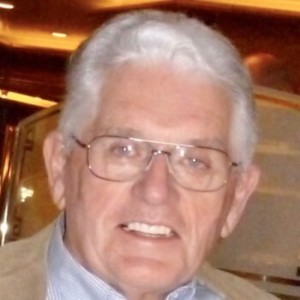
Monday Jul 13, 2020
Episode 105 – Dick Garrett: The Kids Are Smart Enough
Monday Jul 13, 2020
Monday Jul 13, 2020
- Paul and Bill welcomed Dick Garrett to our podcast. Find an overview of his distinguished career in this story about Dick’s zeal for researching and promoting education reform. (The story was written for Purdue’s College of Engineering by Bill last year.)
- Dick’s book, The Kids Are Smart Enough, So What’s the Problem?, traces his growing concerns about problems in public elementary education. Those concerns led to extensive research from a business executive’s perspective, applying systems analysis skills from his background in engineering. Our interview probed not only the findings from that research, but even more current knowledge of education reform efforts which Dick continues to harvest and share. He has created an online gallery of videos for the general public, explicating what he has learned about educational-outcome statistics and various efforts to improve the outcomes. The videos are part of his “Elevate Teachers” website, which champions robust investments to help both teachers and students succeed. .
- Observed as systems established to give students the knowledge and skills they need, elementary schools face a number of challenges, Dick said. They include segments of young people whose daily classroom behavior is a major burden, requiring teachers to pull away from educating in order to focus on discipline during sizable portions of the school day. He says the lack of self-discipline stems from parenting experiences and other factors tied to low-income community conditions.
- Students exhibit the combination of discipline problems and poor academic achievement not because of low intelligence—there is no doubt that they are smart enough to perform well—but because educational systems don’t appropriately respond to gaps in their non-cognitive abilities, according to Dick. He says schools must get better at forming general traits he summarizes as character and grit. His book presents examples of educational approaches that have aimed to enhance those traits, making classroom success more likely for all students and teachers.
- Where that success is lacking, schools fall behind in graduating students with key competitive metrics—especially a grasp of reading and math skills. This shows up in poor rankings for United States schools in statistics tallied by the Program for International Student Assessment, the US Department of Education’s National Assessment of Educational Progress, and other oversight mechanisms.
- A 2004 Public Agenda survey found that 85 percent of teachers felt new teachers were particularly unprepared to deal with disciplinary problems in their classrooms.
- A recent study by the Kirwan Commission yielded a comprehensive report on problems and prospective solutions in elementary education, and this became the basis of a legislative action plan for Maryland schools. The state government acted in early 2020 to approve funding for preliminary implementation of a major initiative based on Kirwan Report recommendations. Dick said one part of the plan envisions hiring 15,000 teachers. A major thrust of the plan is improved education of low-income children, including a cadre of teachers for smaller class sizes.
- One of Dick’s aspirations is to help in spreading the word about the Kirwan recommendations so that educational and governmental leaders elsewhere, such as his home states of Wisconsin and Indiana, will consider and implement similar proposals.
Episode 107 of “That’s So Second Millennium” next month will include part two of the interview with Dick Garrett. If you find the audio quality for this episode a little lacking, don't blame Morgan... she's on vacation this week. It's all Paul's fault (as usual).

Monday May 25, 2020
Episode 102 - Diverse Isolation Stories Could Bring Us Together
Monday May 25, 2020
Monday May 25, 2020
Paul and Bill discussed autism—a subject that arose in Paul’s discussion with Pat Flynn in his own podcast.
John Ratey, popular psychologist, talks about how our sensory apparatus affects how we function in everyday life.
Paul’s comments on the subject of autism connect candidly with recollections from his early life.
Hilaire Belloc, a legendary British author of the early 20th century who wrote on many topics, famously was a friend and Catholic “fellow traveler” with G.K. Chesterton.
“Never waste a good crisis.” Bill says crises in our polity and society are often weaponized rather than used as a learning, community-building experience. This maxim, worded in different ways, has been attributed to various persons, from Rahm Emmanuel to Winston Churchill to Saul Alinsky.
Image by Sukinah Hussain from Pixabay
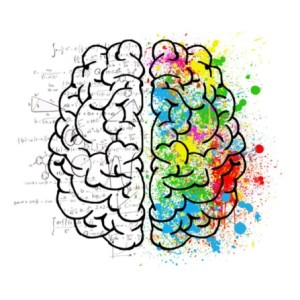
Monday Apr 27, 2020
Episode 100 - Hemispheres Playing God
Monday Apr 27, 2020
Monday Apr 27, 2020
- In this episode we begin with an unscheduled excursion into the realm of the neurobiology of the two hemispheres of the brain and the psychology of reparenting (with nods to our past conversations with Darcia Narvaez, and about codependency and Twelve Step work).
- We discussed the questions related to whether psychology based on a right-brain/left-brain dichotomy provides meaningful tools to increase self-understanding. Paul described his experience with opposite-hand-writing for self-discovery. One interpretation of this kind of experience—a reference for which this writer can provide no validated recommendation or criticism—was found here as an example of the approach, thanks solely to Google.
- We discussed whether the correct half of our brains is really in charge. This is just one of the many online articles you could read to learn more about the left brain-right brain relationships explored in various mentoring programs.
- Bill managed to segue into a different kind of dichotomy—the existential anxiety of the modern secularist, trying to be both relativist and moralist, and assuming impossible responsibilities; we believe God is not there, and we try to do God's job.
- The discussion included mentions of a book called The Master and His Emissary and NPR podcasts respectively called “Hidden Brain” and “”
- The Society of Catholic Scientists 2018 conference generated the artwork that serves as the illustration for these show notes.
- Audio editing by Morgan Burkart, bumper music by Vin Marquardt.

Monday Feb 24, 2020
Episode 095 - Bridges Built by Song, with musician Micki Miller
Monday Feb 24, 2020
Monday Feb 24, 2020
- Where can the search for connections between faith and science (that is, between the deeper sense of meaning in life we all crave and the tangible experiences that our five senses tell us are “real”) take us? Our podcast series today receives inspirational guidance from community-builder and up-and-coming recording artist Micki Miller. She helped us explore one universe of answers where no TSSM episode has gone before. That’s the realm of music.
- Micki Miller, born to pastors in South Bend, Indiana, writes, sings, and produces R&B and soul music that touches people’s hearts. You might say her work, which you can find on Amazon, You Tube, and Bandcamp, is instrumental in the even bigger picture of her life, grounded in a natural passion to bring people together around the words and sounds of authentic love songs.
- Micki and Bill serve on the board of directors of The Music Village, a community musical arts center and school in South Bend. This growing non-profit organization, known for innovative outreach, celebrates music and cultural expressions rooted in the diverse local and global traditions found in the “Michiana” region—sections of Indiana and Michigan neighboring Chicagoland.
- In this episode, Bill interviews Micki about her experience of connecting faith to minds and hearts with a tool kit that has grown along with her dedication to the power of music. The tools include the talent of a singer-songwriter and keyboardist to share sounds of the past and present, the technological skills supporting her local recording studio at the service of her own band and others, and an embrace of synergies among a wide array of people and imaginations.
- Micki talked with TSSM about the ability of music to keep injecting wonder and fresh thinking that can transcend a silo approach to science, religion, and other topics. She discussed this in the context of a retreat-and-recording session series she attends under the direction of DJ Jazzy Jeff, a producer who collaborates with actor Will Smith. News stories have mentioned Questlove (of The Roots seen on “The Tonight Show”) as an enthusiastic fan of Micki. Micki performs internationally, but her ties to family and friends keep her grounded in her hometown and in her efforts as a South Bend region community-builder.
- Paul mentioned that Bill’s favorite among Micki’s You Tube videos is her original song, “You,” performed at the ChiBrations studio in Chicago. (Paul may possibly mix that name up with the name of a musical group in the introduction.)
Addendum: Paul pointed out the official podcast series of Purdue University’s College of Engineering, “Sounds Like the Future.” Bill says it has been one of the great privileges of his journalism and media-consulting career to collaborate with the College in launching the podcast, and he notes it could not have taken shape without the production skills, academic insights, valued friendship, and “great radio voice” contributed by Paul. New episodes will be posted monthly.
Audio production for this episode by Morgan Burkart.

Monday Nov 04, 2019
Episode 084 - Gold Masses, Politics As Religion, Jordan Peterson
Monday Nov 04, 2019
Monday Nov 04, 2019
- This week Bill prods Paul along as he recovers from a massive proposal hangover. This week's episode is the end of a much longer conversation that may or may not otherwise remain on the cutting room floor about Jordan Peterson and other topics as far afield as Homestar Runner.
- We run down the list of Gold Masses that have been publicly announced to take place this coming month--featuring such highlights as a Mass celebrated by the Bishop of Bismarck, ND and a talk at Benedictine University in Lisle, IL on "The Mystery of Faith: from the Gold Mass to Gravity Waves."
- From there, we segue to discussing how in the contemporary world people try to fill to gaping hole left by religion with politics even more than science, and we finish with Bill's comments on one of Jordan Peterson's messages in an interview with Patrick Coffin on the essential role that living our own lives well plays in changing the world.
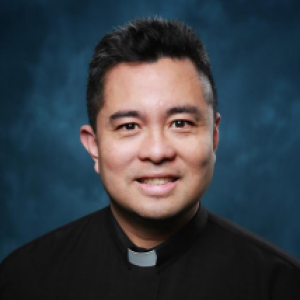
Monday Jul 29, 2019
Episode 070 - Nicanor Austriaco
Monday Jul 29, 2019
Monday Jul 29, 2019
In today's episode we sit down with Fr. Nicanor Austriaco, a Dominican friar, biologist, and bioethicist on the faculty at Providence College. Similarly to our interview with Fr. Lawrence Machia, we discuss the way in which science and a vocation to both the priesthood and life in a specific religious order intertwined in his life, with the additional perspective that his Filipino heritage contributes to his understanding of his vocation and the culture here in America.
- Rev. Nicanor Austriaco, O.P., Ph.D., is a Dominican priest and molecular biologist, on the faculty of Providence College. See his page on the college’s website.
- Cells carry a genetic program for self-death for the good of the organism. Cancer cells do not exercise this self-death. Here is one explanation of that phenomenon.
- Fr. Austriaco belongs to the Eastern Province of the Dominican Order. An early introduction within that order entails learning to remain silent, to trust in the loving presence of God. We talked about the American cultural propensity for busy-ness as a key to one’s sense of success.
- How can we think about the intersection of biological science and moral theology? Fr. Austriaco said this. Biology can help you figure out what’s good for you and what’s not good for you. We are creatures shaped by God through an evolutionary process that took place over a long time frame. Our fulfillment includes trying to understand which of our instinctual desires are perfected and which ones still have to be mastered. That’s the gist of Catholic moral theology. God calls us to joy, and that includes our fulfillment as the biological creatures we are. We must figure out what pleasures achieve the fulfillment of our nature and lead to joy. Pleasure is a grace; it can be a very good thing so long as the pleasure is ordered to our true human nature, our integral human fulfillment, what Christ calls us to.
- Is there a sense in which the Catechism of the Catholic Church is like an “owner’s manual” for the human being in living out a human life? Fr. Austriaco explained that the Gospel is a love letter from God, inviting us into friendship. The Catechism shows us the expectations that come with accepting that friendship. It’s not about what we “have to do” but what we want to do because the friendship is offering the relationship with Christ that brings us fulfillment. An “owner’s manual” concept suggests rules to follow to avoid car malfunctions, but our pursuit is more of a proactive response to God’s invitation of love and happiness. A mechanistic approach like an “owner’s manual” still suggests “I’m in charge” as an individual with a checklist—a deeply American interpretation, as Fr. Austriaco pointed out.
- Shortly after speaking at the annual conference of the Society of Catholic Scientists, Fr. Austriaco also spoke at the Vita Institute, sponsored annually by the de Nicola Center for Ethics and Culture at the University of Notre Dame as an intensive overview of Catholic pro-life principles.
- You can see Fr. Austriaco’s talk to the Society’s 2019 conference on YouTube. You’ll also find there a video of Fr. Austriaco’s 2017 lecture, “Defending Adam after Darwin.”
16:00 dogs and chocolate; biology gives us a specific perspective on what is good and bad for us.
18:00 pleasure and its purpose as well as how it leads us astray
20:00 Bill and the "owner's manual" perspective
22:00 rules secondary to relationships
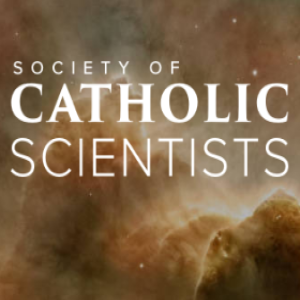
Monday Jun 17, 2019
Episode 064 - SCS 2019 Panel, part II
Monday Jun 17, 2019
Monday Jun 17, 2019
This is the second part of our panel discussion with two conference attendees, Merissa Newton, a philosophy instructor at the University of New England and Geoffrey Woollard, a cancer researcher at the University of Toronto.
[This file is vastly improved from the original version; Bill was able to provide a backup from his portable microphone.]
The individual videos of the conference talks are or will be posted soon at https://www.catholicscientists.org/ideas/theme/video-archive

Thursday Jun 13, 2019
Episode 063 - SCS 2019 Panel, part I
Thursday Jun 13, 2019
Thursday Jun 13, 2019
After laboring through some technical problems, here is our first full post-SCS Conference episode.
We had a panel discussion with two conference attendees, Merissa Newton, a philosophy instructor at the University of New England and Geoffrey Woollard, a cancer researcher at the University of Toronto.
This conference was a heady experience, and as a self-taught amateur podcaster and interviewer, I was absurdly far out of my comfort zone. Things went surprisingly well save for one critical error: I neglected to do much of any testing of my laptop and microphone before I started recording. A whole bunch of lessons I hopefully learned there... In any case, today's audio may be the worst of the conference. I had to think long and hard about whether to air this episode, or what if anything to cut. Bill had backup audio starting halfway through this episode, so feel free to skip ahead to about 17:10 to miss the problematic section.
The individual videos of the conference talks will be posted soon at https://www.catholicscientists.org/ideas/theme/video-archive
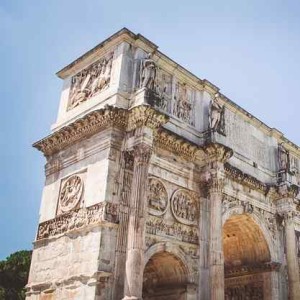
Thursday Jun 06, 2019
Post Christian: Sides to Religion
Thursday Jun 06, 2019
Thursday Jun 06, 2019
My grandmother, Georgia (Joiner) Bredewater, was born on this day in 1921 in Texas.
Just a quick one today in the run-up to the big event at Notre Dame. I had the chance to be on the Pat Flynn Show (upcoming) and we talked about a variety of things. Pat has a very intellectual take on faith. As I was thinking through my life so far in preparation for that conversation, I was considering how it has taught me that there are multiple sides to religion and faith, and I realize that I am lagging behind where I could be on all of them.
You could divide these up any number of ways, but for today I will draw out four of them:
- Intellectual faith. This is about thinking through the philosophical, scientific, theological, and historical issues surrounding a religion and its teachings and deciding whether it seems credible or not. This is how I approach a lot of life (at least on the conscious level!) and was definitely my way in to the Catholic faith in the first place. Catholic Christianity has a huge, well-lit, clearly signed set of intellectual entrances and a huge, expansive, richly decorated set of chambers where we can stand or sit or kneel and enjoy pondering the intellectual beauty of it all.
- Emotional faith. Interestingly, despite all many emotional issues, I had a practice of emotional faith from the very beginning. I have always been attracted to music, and during the years of high school after my initial conversion at 14 I would cultivate this side of myself by singing and teaching myself to play the tunes of different hymns on my clarinet. In a way, as it says in Revelation, I have fallen away from my "first love" as embodied in and built up by these practices, and that hasn't helped me.
- Community of faith. On the other hand, as a teenager I was really an island, like that Ethiopian in the Acts of the Apostles where Deacon Phillip is whisked into his presence just long enough to present some Biblical apologetics, baptize him, and then get whisked away again. I often wonder how that Ethiopian got on when he got home. Fortunately for me, I wound up at the Wash U CSC for four or five pretty happy years... then I went to grad school, and the emotional beating that that applied to me, followed by over a decade of moving every two years (or less), has left me pretty rootless again.
- Meditation and contemplation. And yet, that time at grad school was not wasted in terms of faith either. It was at Notre Dame, for heaven's sake, and you will not find me among those people grousing about Notre Dame selling out its Catholic identity. There are plenty of rich veins of Catholicism there if you take a moment to find them. Somehow I was led to an education for ministry class for adults, and there I got my first real lessons in mental prayer. (We used Opening to God by Fr. Thomas Green, a book whose memory I still cherish.)

Monday May 27, 2019
Episode 061 – Preview of SCS Conference 2019
Monday May 27, 2019
Monday May 27, 2019
Bill and Paul discuss the upcoming SCS conference at Notre Dame, June 7-9, on “What Does It Mean To Be Human?”
Themes we discussed:
The question of human origins:
from the natural theology perspective… when did consciousness, qualia, free will appear?
From the perspective of Judeo-Christian revelation… how do the origin stories in Genesis compare to contemporary archeology and anthropology?
The question of evolution and its significance in a universe with divine providence.
The question of human modification through bio- and electronic technology.

